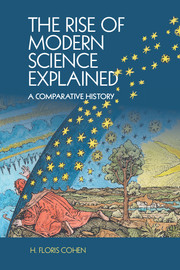Book contents
- Frontmatter
- Contents
- Introduction: the Old World and the New
- 1 To begin at the beginning: nature-knowledge in Greece and China
- 2 Islamic civilisation and medieval and Renaissance Europe
- 3 Three revolutionary transformations
- 4 A crisis surmounted
- 5 Expansion, threefold
- 6 Revolutionary transformation continued
- Epilogue: a look back and a look ahead
- Timeline 1: pre-1600
- Timeline 2: 1600–1700
- A note on the literature
- Provenance of quoted passages
- Index
Introduction: the Old World and the New
Published online by Cambridge University Press: 05 March 2016
- Frontmatter
- Contents
- Introduction: the Old World and the New
- 1 To begin at the beginning: nature-knowledge in Greece and China
- 2 Islamic civilisation and medieval and Renaissance Europe
- 3 Three revolutionary transformations
- 4 A crisis surmounted
- 5 Expansion, threefold
- 6 Revolutionary transformation continued
- Epilogue: a look back and a look ahead
- Timeline 1: pre-1600
- Timeline 2: 1600–1700
- A note on the literature
- Provenance of quoted passages
- Index
Summary
If we had been born a couple or more centuries ago, there is a good chance that we would have been poor, very poor indeed. Our lives would have been spent working on the land, with little or no prospect of change. We would produce large families, but few of our children would outlive us. In any case, we ourselves wouldn't expect to live much beyond about 45. We would call a hovel our home, and heat it in winter with whatever sticks of wood that we were able to collect. Other comforts would have to be paid for either in kind or with the few pennies we had managed to save. Apart from everyday conversation, crying children and the noise of poultry and livestock, we would have lived amidst silence, interrupted on occasion by a thunderclap, communal song, the drums and trumpets of passing soldiers, maybe a lonely church bell tolling every so often. Most of us would have believed without question in the literal existence of spirits or gods or one God as the guiding or even the all-determining power in life and even more so after death.
In short, we would have been living in what is sometimes called the Old World, as distinct from the modern New World which you and I inhabit and which has made us rich and next year may make us richer still. Ours is a world where goods are readily available everywhere; however many we may own today we can always obtain newer and more up-to-date versions of them tomorrow. We are living longer and we are dying of mostly different diseases. Noise surrounds us wherever we go. We are parents of a few carefully planned and properly vaccinated children, who are likely to live even longer than we will. Many of those among us who still regularly go to church are no longer inclined to take the texts recited there in their literal sense. Our everyday behaviour is oriented towards this life – however hard we may try we find it difficult to imagine what life after death might possibly be like. When we travel we usually reach our destination by air, rail or motor car within hours instead of after days or weeks on horseback or on board a pitching barque, more concerned about tailbacks or punctures than ambush by pirates or robbers.
Information
- Type
- Chapter
- Information
- The Rise of Modern Science ExplainedA Comparative History, pp. 1 - 6Publisher: Cambridge University PressPrint publication year: 2015
